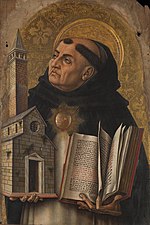Quinquae viae
From Wikipedia, the free encyclopedia

| Part of a series on St. Thomas Aquinas |
| Thomism |
| Thoughts of Aquinas |
| Negative theology |
| Divine simplicity |
| Peripatetic axiom |
| Quinquae viae |
| Beatific vision |
| Sacraments |
| Principle of double effect |
| Natural law |
| Cardinal virtues |
| Just War |
| Just price |
| Works |
| Summa Theologica |
| Summa contra Gentiles |
| Contra Errores Graecorum |
| Notable People |
| Aristotle ("The Philosopher") |
| Ulpian ("The Legal Expert") |
| Pseudo-Dionysius |
| St. Augustine ("The Theologian") |
| Avicenna |
| Peter Lombard ("The Master") |
| Al-Ghazali |
| Averroes ("The Commentator") |
| Maimonides ("Rabbi Moses") |
| St. Bonaventure |
| Reginald of Piperno |
| Pope Pius XII |
| Henri de Lubac |
| Related |
| Aristotelianism |
| Dominican Order |
| Scholasticism |
| School of Salamanca |
| Neo-Thomism |
The Quinque viae, Five Ways, or Five Proofs are five arguments for the existence of God summarized by the 13th century Roman Catholic theologian St. Thomas Aquinas in his book, Summa Theologica. The five ways are; the argument of the unmoved mover, the argument of the first cause, the argument from contingency, the argument from degree and the teleological argument. Aquinas left out from his list several arguments that were already in existence at the time, such as the ontological argument of Saint Anselm, because he did not believe that they worked. In the 20th century, the Roman Catholic priest and philosopher Frederick Copleston, devoted much of his works to fully explaining and expanding on Aquinas' five ways.
The arguments are designed to prove the existence of a monotheistic God, namely the Judeo-Christian God (though they could also support notions of God in other Abrahamic faiths that believe in a monotheistic God, such as Islam, Rastafari and the Bahá'í Faith), but as a set they do not work when used to provide evidence for the existence of polytheistic, pantheistic, panentheistic or pandeistic deities such as those found in major religions like Hinduism, Shinto and Wicca.
Contents |
[edit] The Five Ways
These proofs take the form of philosophical arguments:
[edit] The Argument of the Unmoved Mover
The argument of the unmoved mover, or ex motu, tries to explain that God must be the cause of motion in the universe. It is therefore a form of the cosmological argument. It goes thus:
- Some things are moved.
- Everything that is moving is moved by a mover.
- An infinite regress of movers is impossible.
- Therefore, there is an unmoved mover from whom all motion proceeds.
- This mover is what we call God.
[edit] The Argument of the First Cause
The argument of the first cause (ex causa), tries, unlike the argument of the Unmoved Mover, to prove that God must have been the cause, or the creator of the universe. It is therefore a form of the cosmological argument. It goes thus :
- Some things are caused.
- Everything that is caused is caused by something else.
- An infinite regress of causation is impossible.
- Therefore, there must be an uncaused cause of all that is caused.
- This causer is what we call God.
[edit] The Argument from Contingency
The argument from contingency (ex contingentia):
- Many things in the universe may either exist or not exist. Such things are called contingent beings.
- It is impossible for everything in the universe to be contingent, for then there would be a time when nothing existed, and so nothing would exist now, since there would be nothing to bring anything into existence, which is clearly false.
- Therefore, there must be a necessary being whose existence is not contingent on any other being or beings.
- This being is whom we call God.
[edit] The Argument from Degree
The argument from degree or gradation (ex gradu). It is heavily based upon the teachings of the ancient Greek philosopher Plato. It goes thus :
- Varying perfections of varying degrees may be found throughout the universe.
- These degrees assume the existence of an ultimate standard of perfection.
- Therefore perfection must have a pinnacle
[edit] The Teleological Argument
The teleological argument or argument of "design" (ex fine), which claims that everything in the Universe has a purpose, which must have been caused by God :
- All natural bodies in the world act towards ends.
- These objects are in themselves unintelligent.
- Acting towards an end is characteristic of intelligence.
- Therefore, there exists an intelligent being that guides all natural bodies towards their ends.
- This being is whom we call God.
[edit] Criticism
Serious criticism of the cosmological argument emerged in the eighteenth century by the philosophers David Hume and Immanuel Kant[1].
20th century Christian apologist Richard Swinburne argued in his book Simplicity as Evidence of Truth, that these arguments are only strong when collected together, and that individually each of them is weak.
The vocal 21st century atheist Richard Dawkins, criticises Aquinas' collection of arguments in his book The God Delusion. He asserts that:
- the first three arguments are essentially the same, and rely upon the idea of a regress to which God is unjustifiably immune;
- the fourth argument is applicable to a whole lot of other concepts;
- the fifth argument claims the necessity of a designer, considering that biological life looks somewhat designed, whereas evolution by means of natural selection explains its complexity and diversity.
[edit] See also
[edit] External links
- Thomas Aquinas, from the Summa Theologia
- New Advent, Translation of the Summa Theologica
- Kreeft, Peter. Summa of the Summa, Ignatius Press, 1990. ISBN 0-89870-300-X
[edit] References
- ^ "Cosmological Argument", Stanford Encyclopedia of Philosophy
|
||||||||


